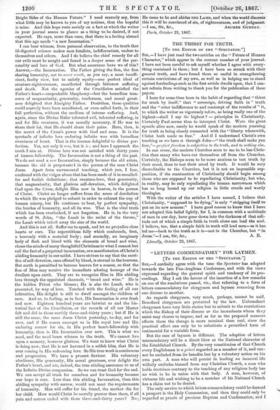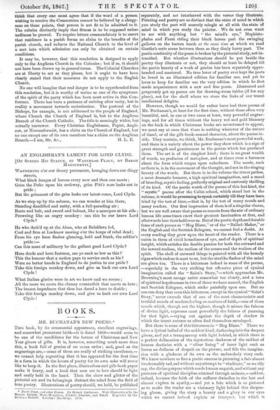"LETTERS COMMENDATORY" FOR LAYMEN.
[To THE EDITOB OF THE "SPECTATOR."] cordially agree with the tone the Spectator has adopted towards the late Pan-Anglican Conference, and with the views expressed regarding the general spirit and tendency of its pro- ceedings. May I ask the favour of the insertion of a few remarks on one of the resolutions passed, viz., that referring to a form of letters commendatory for clergymen and laymen removing from one diocese to another.
As regards clergymen, very much, perhaps, cannot be said. Beneficed clergymen are protected by the law. Unbeneficed clergymen have very little choice but to submit to the restrictions which the Bishop of their diocese or the incumbents whom they assist may choose to impose, and as far as the proposed measure affects them the change is more nominal than real, since the practical effect can only be to substitute a prescribed form of testimonial for a variable form.
But the case of laymen is different. The adoption of letters commendatory will be a direct blow at the National character of the Established Church. By the very constitution of that Church every Englishman is a priori regarded as a member of it, and can- not be excluded from its benefits but by a voluntary action on his own part. A man who will persist in leading an immoral life wilfully excludes himself from any Christian Church, a man who holds doctrines contrary to the teaching of any religious body has no wish to be in union with that body. A man, however, of virtuous life and wishing to be a member of his National Church has a claim not to be denied.
The only service to which letters commendatory could be deemed a passport is the Holy Communion, and then they could only be regarded as proofs of previous Baptism and Confirmation, and I think that every one must agree that if the word of a person wishing to receive the Communion cannot be believed by a clergy- man on these points, that person is not fit to be admitted to it. The rubrics distinctly imply that fitness is to be supposed unless unfitness be proved. To require letters commendatory is to assert that residence in a parish forms no claim to the benefits of the parish church, and reduces the National Church to the level of a sect into which admission can only be obtained on certain conditions.
It may be, however, that this resolution is designed to apply only to the Anglican Church in the Colonies ; but if so, it should not have been drawn up in general terms. The Colonial Churches are at liberty to act as they please, but it ought to have been clearly stated that their measures do not apply to the English Church.
No one will imagine that real danger is to be apprehended from this resolution, but it is worthy of notice as one of the symptoms of the spirit of the party which has been most active in this Con- ference. There has been a pretence of striving after unity, but in reality a movement towards sectarianism. The pastoral of the Bishops, for example, is not addressed to the people of England, whose Church the Church of England is, but to the Anglican Branch of the Church Catholic. The title is seemingly wider, but actually narrower. Every Christian Englishman, Papist, Angli- can, or Nonconformist, has a claim on the Church of England, but no one except one of its own members has a claim on the Anglican



































 Previous page
Previous page